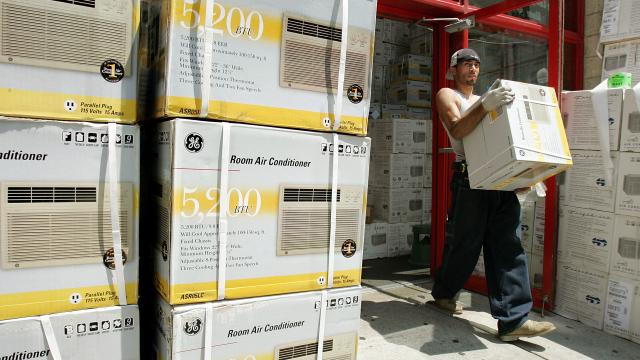While the world was still hungover from the major climate conference in Poland last month, a game-changing climate treaty quietly went into effect.
The Kigali Amendment entered into force as the calendar turned to 2019 and with it, the world began to put the clamps down on some of the most potent greenhouse gases on Earth. Now if only the U.S. would sign on.
It’s taken years for the amendment to take shape and ratify, and it all stems from a big whoopsie in the 1980s. Then, scientists realised that chlorofluorocarbons (CFCs) — chemicals commonly found in air conditioners, refrigerators, and other cooling technologies — were screwing up Earth’s ozone layer.
The world’s governments acted quickly to phase them out, passing the Montreal Protocol, an international treaty that’s considered to be among the most successful environmental treaties ever agreed to.
There was just one problem: The chemicals that replaced CFCs were insanely potent greenhouse gases. Pound for pound, hydrofluorocarbons (HFCs) warm the planet up to 11,700 times more than carbon dioxide. And ironically, as the planet heats up, the emissions tied to HFCs.
To stave that off, countries proposed amending the Montreal Protocol to phase these chemicals out too. Doing so could cut global warming up to 0.4°C by 2100.
In 2016, the world agreed to the Kigali Amendment and since then, countries have been signing on. The amendment went into force last week with 65 countries ratifying it. Those ranks include industrial heavy hitters like European Union, Japan, Canada, and Australia as well as a host of developing nations, and the United Nations said it expects more to join the coming weeks.
Notably absent are China and the U.S., the two biggest manufacturers and users of HFCs. China is expected to sign on.
The U.S. remains a wildcard, though, largely due to the White House and its seeming inability to get its act together. The Kigali is a rare environmental agreement that basically everyone else agrees is necessary.
Just last year, 13 Republican senators asked the White House to send it to the Senate for ratification. The refrigerant industry is for it and published a white paper showing it could result in an additional 33,000 U.S. manufacturing jobs and $18 billion in additional economic output to both replace HFCs and destroy the climate-warming chemicals.
The industry has also suggested that China could get a leg up on the U.S. if it ratifies the treaty and begins manufacturing and distributing HFC-free refrigerators and air conditioners to the world.
It should go without saying that people who care about climate change are also pro-Kigali. But reactionary politics in the executive branch have mucked up what should be a pretty seamless process.
“All the relevant constituencies want it done,” David Doniger, the senior strategic director for climate and energy at the Natural Resources Defence Council, told Gizmodo.
“The only one that doesn’t is a bunch of ideologues at [libertarian think tank] the Competitive Enterprise Institute, [and] there are ideologues in the administration who don’t like environmental regulations, who don’t like climate regulations, and who don’t like international agreements, environmental or otherwise.”
Doniger also said the Trump administration’s penchant for chaos and mismanagement has also probably mucked up the process. In a perfect world, the State Department, which negotiated the treaty under Obama, would convene an interagency working group and sign off on sending it to the Senate where ratification by a two-thirds majority vote seems pretty likely.
Yet despite the apparent inaction in the executive branch, former Trump energy advisor George David Banks told E&E News that he feels “bullish” the White House will send the amendment to the Senate for ratification in the coming months. Even if the amendment doesn’t make it there, Doninger said the U.S. still has some pathways forward to not fall totally behind.
As with most things in the Trump era, states could lead the way with California at the front of the pack. The state has already banned HFCs in new air conditioners and refrigerators and a handful of other states followed suit.
Congress could also step up its game, especially given the bipartisan agreement that phasing out HFCs is good for the planet and U.S. business interests. A bipartisan group of six senators, including both Republicans from refrigerant-manufacturing powerhouse Louisiana, introduced legislation to speed up the HFC transition last year.
If the White House fails to act, Congress, including the climate-minded Democratic majority in the House, could if not ratify the amendment, at least pass legislation that mimics it.
“There’s a lot going on even in the U.S. to make the phase down happen even while the Trump administration is in limbo,” Doniger said.
